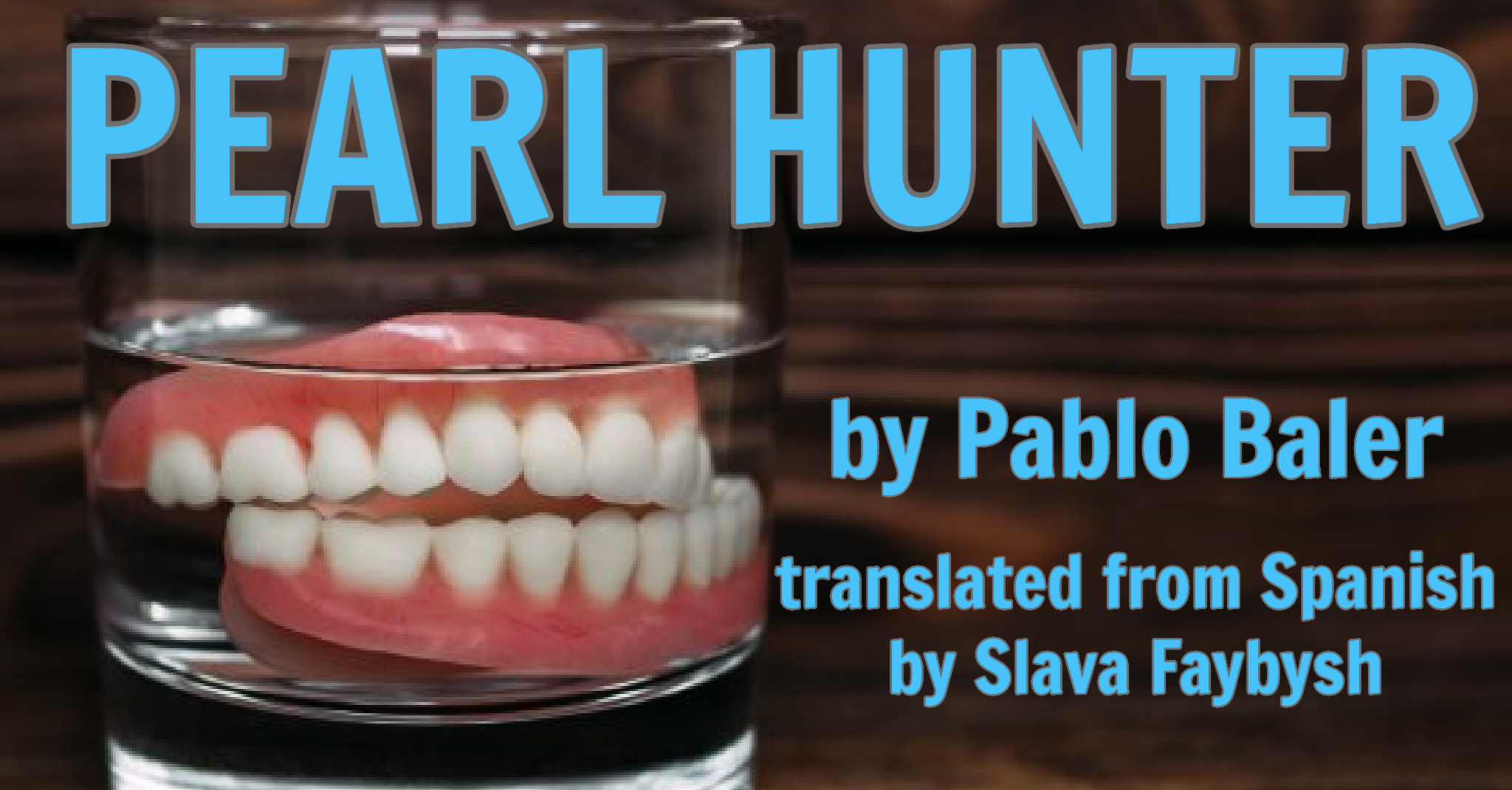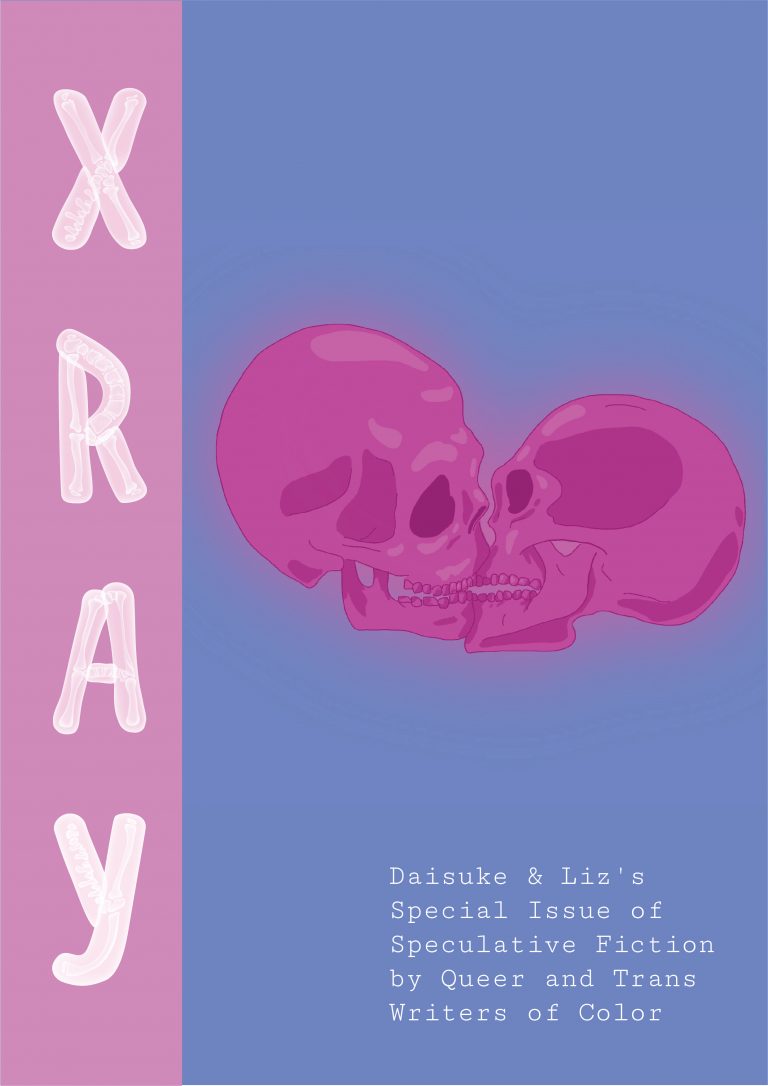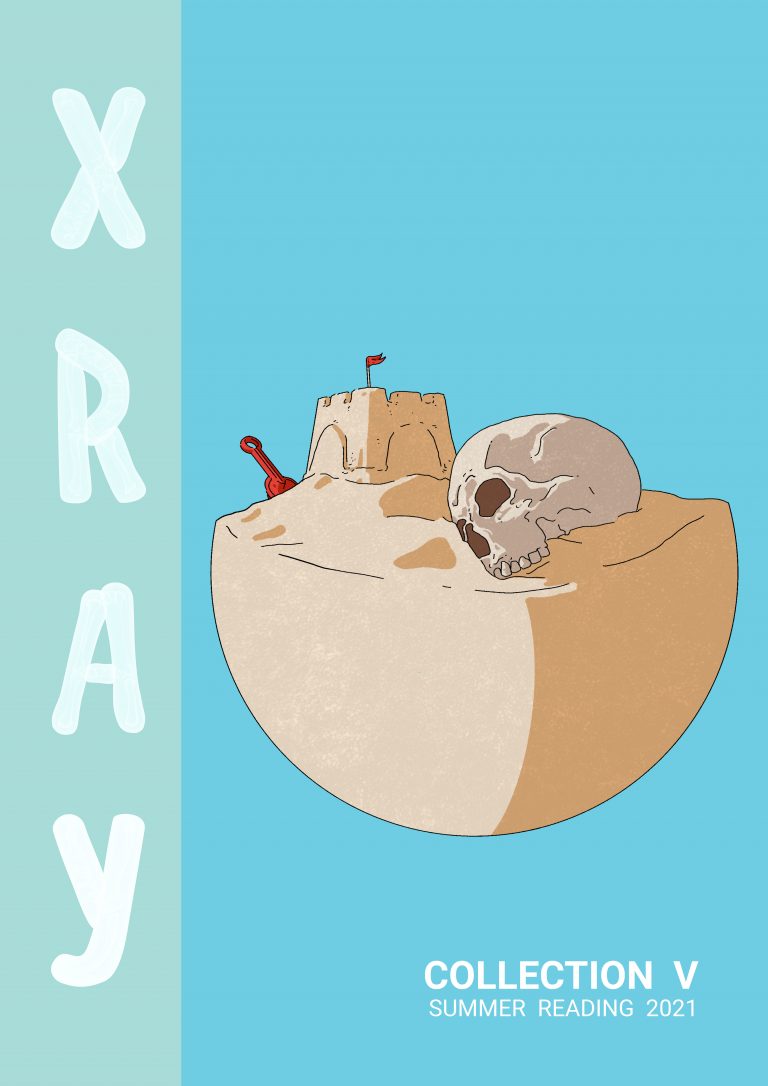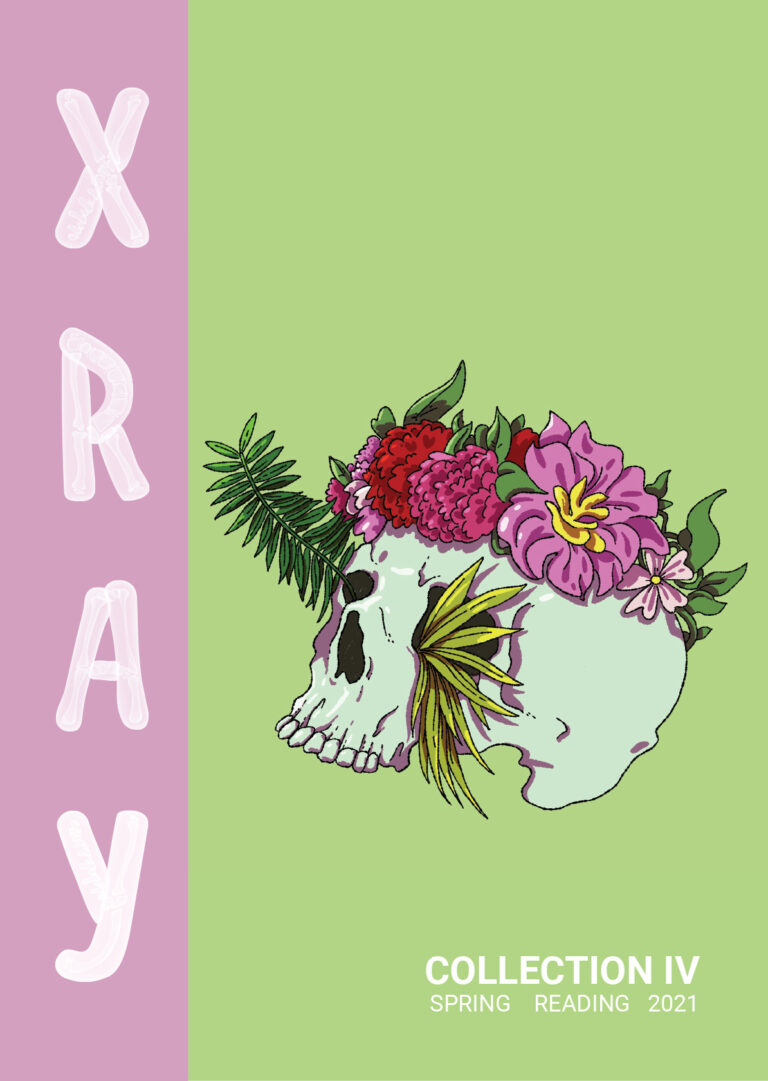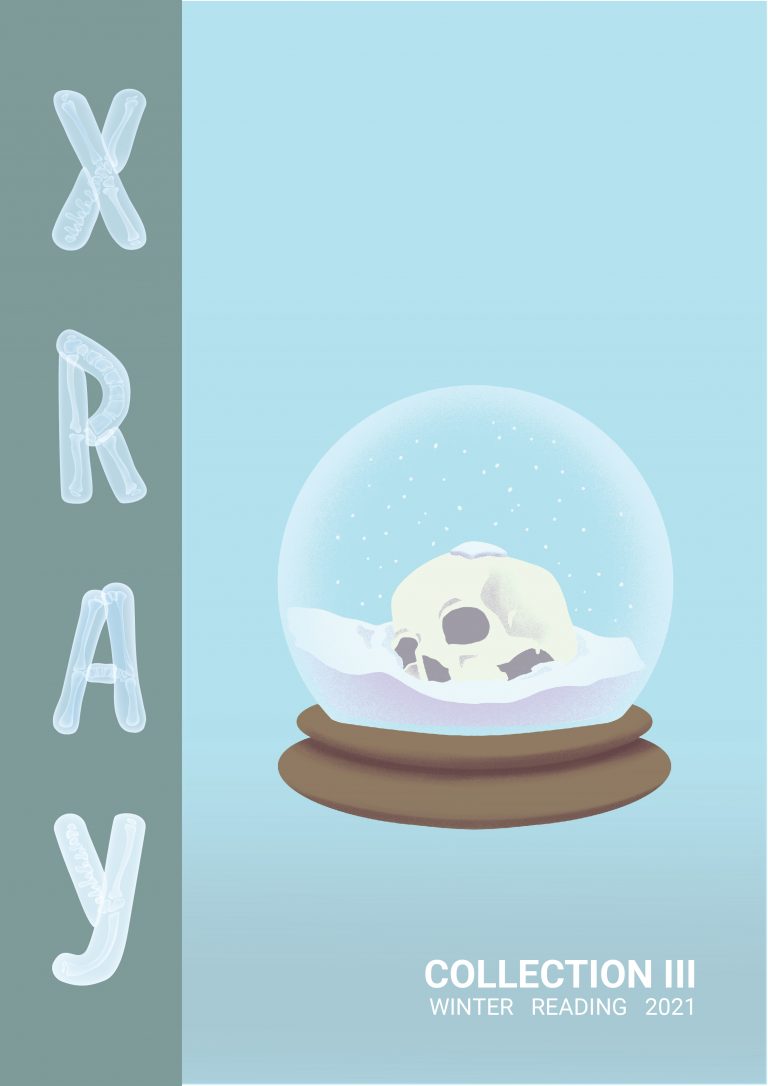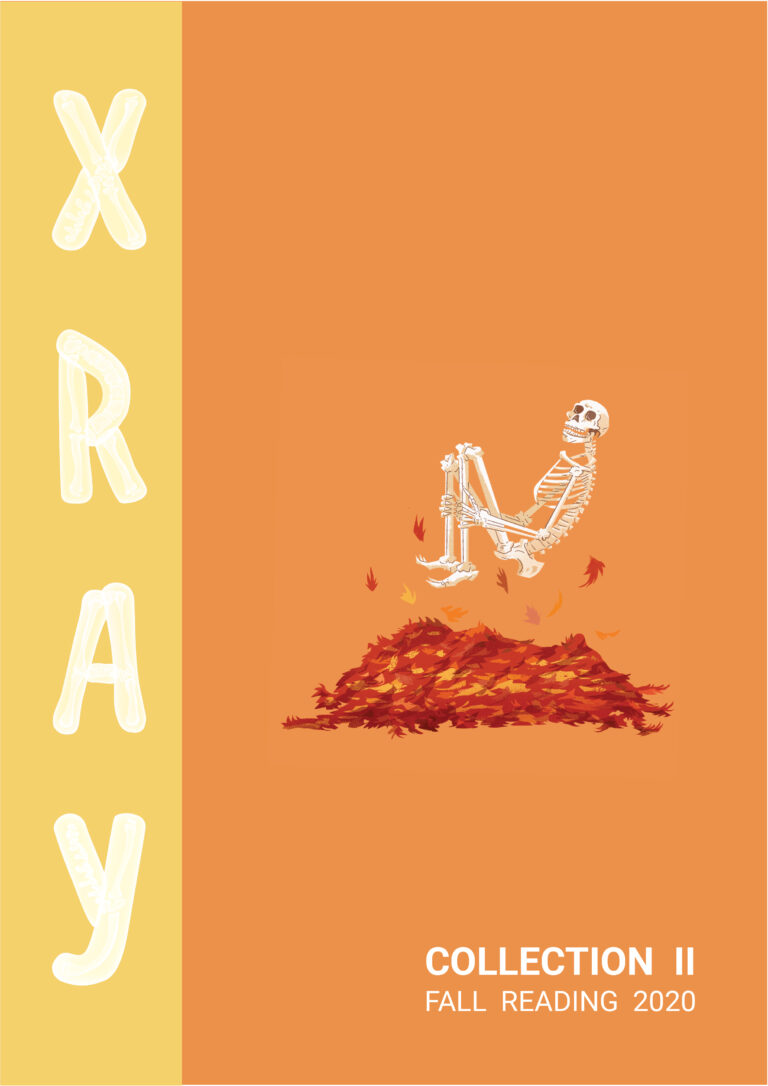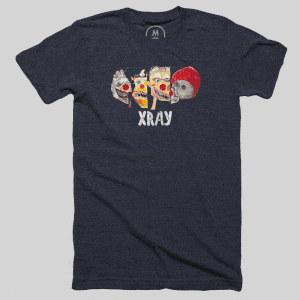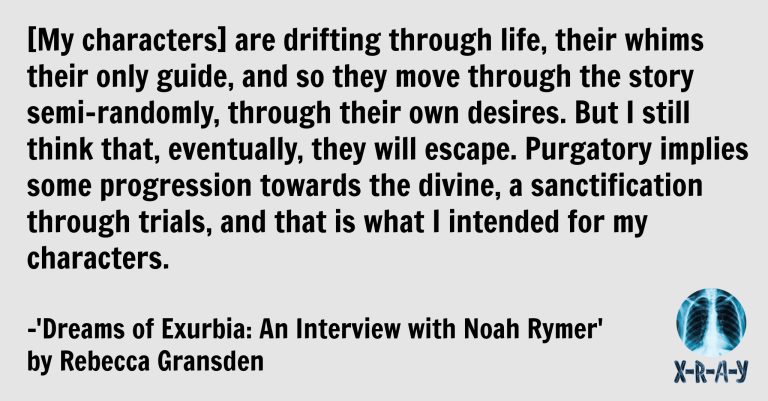
Interviews & Reviews
DREAMS OF EXURBIA: AN INTERVIEW WITH NOAH RYMER by Rebecca Gransden
Noah Rymer’s domain is that of the illuminated store, the lonely places on the outskirts of town, the back rooms of an America in thrall to the failure of its own myth. With denouement (Anxiety Press, 2025) Rymer envisions a peripatetic slumberland, surroundings subject to abstruse moods. Nowhere addicts succumb to an anaesthetised pulse, ensnared by the numb rhythms of a society gone ill on its symptoms. I spoke to Noah about the book. Rebecca Gransden: Simple place to start, where did denouement begin? It strikes me as a piece that has a lifetime’s worth of backstory and experience tied up in its making, but do you recognise a point at which it came to take hold, to form its current incarnation?Noah Rymer: denouement definitely has its roots from a lifetime spent in suburbia, but it’s hard to think of when it all came together. Most of it stemmed from a desire to explore the psychogeography and mythology of the American suburb, the misé en scene of what surrounded me growing up.I remember being very much influenced by classic Americana literature such as ‘The Swimmer’ and Don Delilo’s White Noise, the latter of which I stole heavily from. Reading Delilo really set things in motion, and helped flesh out a lot of what I wanted to do with denouement. Hearing The Specials’ “Ghost Town” for the first time was huge—it became the theme song for the book. I think reading Baudelaire was crucial to the story really coming together as well; my unnamed character quotes a bit of French in the graveyard scene, which is actually a prose-ified part of my favorite Baudelaire poem, “The Swan.” His [Baudelaire’s] understanding of boredom-as-vice plays a huge factor in how the story develops, because almost everything is arrived at because of an inherent desire not to be bored, to satiate a certain curiosity.RG: Your writing lives in suburbia, on highways, down supermarkets aisles. The places that are everywhere and nowhere. How do your characters react to these environments? There’s a background uniformity, a sameness, to the landscape that suggests a melancholic form of inertia, as there is no hope of a different place to escape to, even if a moving away is possible. How does psychogeography factor into your work?NR: I think my characters are suffused with an inherent sadness, a damning boredom from their surroundings. I know I was. There’s always been something sinister to me about suburbia, and I’ve carried that sense of unfamiliarity within me ever since I was a kid. They (my characters) are trapped in a state of limbo, a kind of purgatory, a labyrinth with no apparent exit. Psychogeography has been a fervent interest of mine these past couple of years, and denouement definitely wouldn’t’ve been the same if I hadn’t read Debord before working on it; reading the Situationalist International Anthology was huge for me. I love the dérive as well, although I utilized the tactic more so when I was in the city. I believe I unconsciously applied the tactic to the lives of my characters—they themselves are drifting through life, their whims their only guide, and so they move through the story semi-randomly, through their own desires. But I still think that, eventually, they will escape. Purgatory implies some progression towards the divine, a sanctification through trials, and that is what I intended for my characters. After I wrote denouement, actually, I understood it as part of a triptych—like Bosch’s The Garden Of Earthly Delights, or a literary trilogy—like Dante’s Divine Comedy. So this is my Purgatorio; I’ve just finished writing an Inferno, and right now I’m penning my Paradisio. So all of what I write is guided towards an ultimately hopeful and cathartic end, even if it doesn’t seem that way at first.RG: she moved like a ghost throughout the two-story and basement as if it were a decrepit Gothic castle, damaged by an unspeakable past with an uncertain future in permanent collision with the former, crashing in slo-motion. her voice came out scratchy and uncertain, like the movements of a deathly-rusted machine. The machine is a theme I picked up on, whether it be rattling radiators and air-conditioned rooms of suburban living or the gasoline gods that drift the roads of a ritualized America. There is a rhythmic force to your writing that parallels the propulsion of the machine. How do you view the machine when it comes to your fiction?NR: denouement is very much car-centric because it is a product of American culture. Yet it is fetishistic in a different way than how Crash approaches it; it is fetishistic in the sense of ‘fetish’ as an idol worshiped. The car becomes the byword for ‘freedom,’ self-propulsion, to be one’s own person. The car is Promethean. In other moments, though, I can see and understand transit (the metro, the car, the bus) as a kind of modernization of Charon’s ferry, so there’s a duality there: that of self-propulsion, and of being brought to one’s end, in the teleological sense.As an aside, I also think that the rhythmic propulsion that you mention was influenced by listening to acid house during the writing process. It’s the kind of music that seeps into you, dictates how you pound the keyboard, how you understand the movement of your characters—both in their own gestures as well as how they themselves glide through the story by your own writer’s hand. And acid house, of course, is a perfectly machinated genre of music. It is thoroughly inorganic and plastic, and, as such, perfectly represents and replicates the prefabricated and artificial social structure of the suburbs.RG: denouement addresses the protracted decline of a culture enthralled by consumerist doctrine. Stores are meccas, a place subliminally signaling a religion substitute, a surrogate for the protections of family. Shopping is framed not as a task undertaken out of need, but as an experience, with store displays taking on artistic dimensions. What was your approach to the theme of consumerism for denouement?NR: Mere observation. I think that’s what most of the novella was, actually—making passive observations and then adding my personal commentary. I think I tapped into consumerism in particular because I used to work at a grocery store for a couple of years, and so I was completely inundated by it all. I used to dream of working, actually. I couldn’t escape the flow of commerce. I heard the machinations of product in my mind, at home, wherever I went, and it became an all-consuming force. It’s also because America has an inherently capitalistic framework: consumption is built into the American mindset, is as natural as breathing. It also helps that I’m Catholic, and the parallels between genuine religious experience and its secularized equivalents become just clear enough to be properly horrified at. We live in an age of substitution, of signifiers who have forgotten what they signify. All of the crosses become inverted. RG: There is music to the world of denouement. The beeps from cash registers, the humming of refrigerators, all serve to create an environment primed to lull your characters into a form of unconscious automatic functioning, sleepwalking consumers wrapped in a narcotic and dazed mindset. Music acts find a place at a dive called Rat King. Traffic flows. I understood your characters as possessing an unconscious drive to break free from the rhythm. How do your characters attune to the rhythm? What place does chance play?NR: As I mentioned before, I was listening to a lot of acid house during the writing and editing process, and I think that dissociative groove is very much baked into the story. My characters are smart enough to recognize the palliative aspects of all of these forms of machinated harmony, to point it out and commentate on it, but cannot escape feeling dehumanized themselves by their presence, alienated by what surrounds them. They can’t escape it. Intelligence cannot, and does not, grant salvation, so even if Julie can, for example, see the kids at the house party and recognize how completely dead inside they are as they perfectly synchronize in doing the Macarena, she still can’t escape from feeling dead inside herself. Chance doesn’t play too big of a role in the story for me, but I do think it leads to revelation. The first example of this is the unnamed character wandering to the bedroom where they’re having the orgy, and she is able to see it for what it really is: a desperate hedonistic escape, a fantasy that has collapsed in on itself and is now shown in all of its depravity. The second example is at the end of the novella, when she stumbles upon the old bluesman singing his little hymn and at that moment is shown the light in a small but meaningful way. And she realizes a form of catharsis in writing down the events of the night. RG: Small details imbue the world of denouement with its own energy. Your descriptions ensnare the background detritus and panorama of modernity. Advertisements, branding, flyers become beacons. When it comes to style, is that something you’ve honed over time or has it evolved naturally?NR: It’s hard to say. I think it’s a little bit of both. In the process of writing denouement, I surrounded myself with a particular set of influences that would help me nail the aesthetic and the atmosphere: Gregg Araki films, Euripides’ Bacchae, Dub Housing by Pere Ubu, Jim Morrison’s poetry. So in that sense it was honed. But I do think my style has also evolved naturally, because I’ve always been writing about the dark side of suburbia—denouement represents the sum total of that. I think all the themes and ideas that I had experimented with prior find their fullest expression here. It was something that I was unconsciously working towards.RG: A character that stands out to me is The Milkman. He’s a purveyor of illicit substances, and the persona he’s invented for himself toys with the idea of drugs as a healing or palliative measure. He refers to his clients as ‘patients.’ What medicine is The Milkman delivering?NR: Milk was actually a cameo for a character I originally wrote in a short story, ‘Dead Los Angeles’. But in denouement he’s a lot more sinister, Luciferian, the closest thing to an antagonist within the narrative. I think it’s a negative healing that he delivers, that he ultimately wants to ensnare people within that palliative haze. But at the same time the drugs he administers to the unnamed character provide the opposite effect to what recreational drugs usually do. Instead of masking reality, he reveals it as much as he revels in it; The Milkman is physically a person, but spiritually an insect, a disgusting cockroach-like beast whose layer of humanity peels off as soon as my unnamed character takes the drugs. And so she sees things for how they really are—everyone becomes a manifestation of their own vice, and so their ugliness is presented on the outside as well as on the inside.I tried to reveal the spiritual reality through a material monstrosity the way that Flannery O’ Connor utilizes the grotesque in her stories to the same end. Milk was also inspired by the passage in Genesis where the serpent tempts Eve to eat of the fruit of The Tree of Good and Evil, and in a sense, the unnamed character has a certain innocence that Milk completely shatters. But to be completely honest, I originally wrote him in as an excuse to write the Burroughs-esque/Cronenbergian scene that follows. So I had a lot of fun writing my interpretation of a bad trip. But I’m also glad I found something to say with it as well. RG: the doors flew open with a quick BANG and quickly slammed against the wall as a robber, in an act of nervous bravado, announced his presence in a voice that was strong and shaky, the first-time tremor of a decent kid hard-up and down on his luck. his dialogue was clearly influenced by all the gangster movies he watched, his actions betraying famous scenes and heists studied carefully on the screen. but in his execution, it all fell to pieces, like a bad theater student trying their hand at improv.Your writing poses the question of what part the cinematic plays in culture, and to what degree the screen simultaneously reflects, infiltrates, or guides. Is film an influence on your work?NR: I’m glad you asked the question, because I used to be a film critic! Film is perhaps the biggest influence on my work, and I always imagine my writing playing out like one. I’m always thinking in terms of lighting, cinematography, staging, etc., and tend to think of my stories on the visual level, as opposed to in terms of plot, dialogue, or anything which would be more literary than filmic.I’ve always been interested in the mimetic qualities of film as well, which goes all the way back to Aristotle’s Poetics and his understanding of tragedy as something that we imitate, that we take on the emotions of the tragic hero and thus experience catharsis—the evocation of fear and pity. But, as you point out through the excerpt, mimesis can tend more towards the copying of actions, the erasure of the boundaries between real life and media. I think American Psycho influenced me in this way—there are scenes where Patrick Bateman is watching a horror movie before he kills someone, or pornography before he goes to pick up a prostitute. And then there’s Emperor Nero, who thoroughly blurred the distinctions between real-life and the stage throughout his tenure as ruler. I couldn’t tell you what all of this means, exactly—either in relation to my own work or the culture as a whole. But there’s definitely something there, something dangerous and revelatory. RG: Immediately, an intense, suffocating silence was draped over the masses like a burial shroud, stifling the slightest whimper or roll of a solitary tear with the immediate brutality of what had just been said. Death was supposed to be something far from our own reality, something that only happened to the elderly, or a distant relative. Now the truth had appeared, uninvited and unwarranted, with horrific immediacy. Class was dismissed for that day and the next. In “The Book of the Dead” a string of deaths brings a dose of weirdness to a small town. It is a place where conspiracists stir a form of religious apocalypticism and the residents look for a mystical driving force behind events. What is your approach to the strangeness of suburbia?NR: I think the strangeness is most defined by not delving into Lynchian territory (or trying not to, at least), even though Lynch has always been a huge influence on my work. So I write the alienation that I personally feel, and how that alienation can manifest outwardly. But I usually take cues/steal from horror movies and weird fiction in order to fully realize the ‘suburban gothic.’ I think of what I do as inherently expressionistic, that the inner world of my characters is reflected in their environments, but I do think it also goes vise-versa. RG: denouement will be released by Anxiety Press. How have you found the process of working with them, and what is your opinion of the small press scene in general?NR: It’s been pretty chill, honestly! I just sent over the manuscript to the E.I.C. and he said it looked cool, that he’d like to work on it. He sent over the cover art some time ago, which I liked, and that’s all there’s been so far. I haven’t spoken to the guy since August, but I figure he’s pretty busy as is, so I’ll try not to bother him. I am a little biased, since I run a small press myself (Pere Ube), but I do have a lot of love for the scene—at least, the handful of indies that I prize above the rest: I gotta give props to joints like Ex-Pat, BRUISER, and APOCALYPSE CONFIDENTIAL. I usually have a more adverse reaction to the other presses and mags, particularly the ones that are seeking to serve an agenda, to fill a quota. From what I’ve seen in a lot of contemporary indie presses, there’s a belief that fiction must have a social purpose, must be representative of diversity, must be didactic, and that all seems like such a drag to me. The small presses that I mentioned, that I like, are good because they prioritize the craft of the writing rather than the identity of the writer, and I respect that more than anything else.RG: Do you consider how someone who reads your work might react to it?NR: All the time! But it’s less of ‘will they like this’ and more of ‘will they understand what I’m trying to say.’RG: There is an idea that once you live long enough in the same place, it begins to turn sour the more you try to identify it, understand it, dissect it—ants swarming over the bloated corpse of a crow or spiders eating the insides of a caterpillar in well-trimmed lawns and clean-cropped woods, that very soon every house becomes a haunted house, even the one you grew up in and have lived in your whole life, and yet it all comes to a conclusion within the simple realm of psychology, paranoia, mental illness and the like, residing within little else but Zoloft-hallucinations and cough-syrup.The above excerpt is lifted from “Prom”. Does denouement haunt you?NR: Everything haunts me; denouement is just an attempt at putting it all on the page.
May 6, 2025
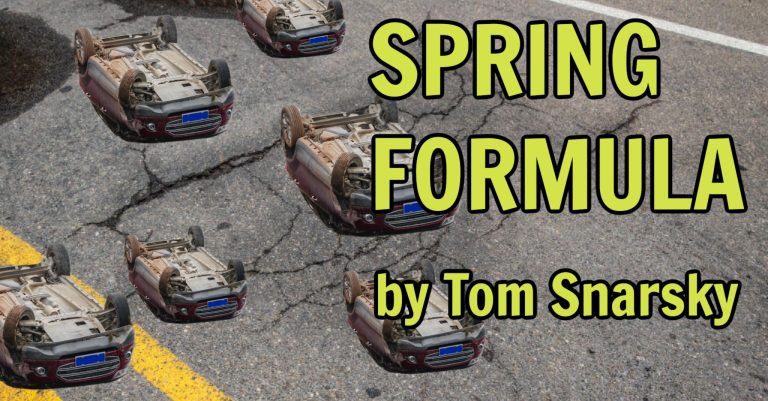
Fiction
SPRING FORMULA by Tom Snarsky
I notice some crocodile cracking near the bend, which is already pitched the wrong way—against the turn, so as a car’s tires point left the road’s normal force pushes it right, recipe for a rollover—and think somebody’s going to get killed. So I go to the municipal office to complain, but no one’s there. BE BACK SOON says the sign. So I grab one of the envelopes and start to write on it, just right on the envelope, my name is Ryan Pendleton I live at 29 Keep Tryst Rd in the Hermitage and someone’s going to get hurt and then the woman comes back, hi can I help you? And I say yes who can I talk to about some alligator cracking in the road, and she says pardon me, and I say I mean there’s bad damage, something really terrible could happen, I grew up by that bend and I know how kids drive on it, it’s dangerous even without the cracks, who can I talk to about putting a sign up? and scheduling some maintenance? And she says sir that would be traffic, or well hold on, paper shuffle, to be exact you’d probably have to talk to the sheriff about the sign, and the maintenance would be the state department of transportation, and by now I’ve been here ten fifteen minutes, all in the wrong place, so I’m starting to get a little short with her, not her fault and I’d like to think not mine either but I say okay, the sheriff as in across the street? Or across town? because I can’t remember if it’s the cop cars that say Monroeville Police that park across the street and the cop cars that say Duquesne County Sheriff that park across town, or the other way round, and she says as in across town, and I say I walked here, you know, I don’t have a car, I can’t walk all the way down Main Street and still get there in time, can you call him? And she says okay sir but I’m sure he’ll ask you to set up an appointment, maybe for Monday but I’m not certain, and that’s when my fist hits the desk, involuntarily really, I am just six layers deep of not getting this simple fucking concern addressed, and as I’m trying to level my voice back out Is There A Problem Here? and I turn and no-sir one of the Monroeville Police’s uniformed officers, not even the correct side of town but he’s eyeing me, he’s right by the envelope I put down, just trying to get some information here sir as regards a road near where I live and of course he picks it up and reads it, and the woman’s face doesn’t not register fear, and secondly I may or may not be a known Concealed licensed entity to some among the Duquesne blue so suddenly Monroeville’s More-or-Less Finest is doing some spring kinematics in his head, one hand hipped and one hand in the kind of palm-forward configuration that’s meant to calm but really feels like he’s trying to summon some kind of invisible force power to get you where he wants you, at the very least down and disarmed, and while he’s getting closer I’m thinking of Eddie, that girl from high school’s little brother who didn’t wear a seatbelt when his sister’s friends were whipping around Long Pond Road and lost control and it was only Eddie who went through the windshield, only him, probably saw the most amazing shower of glass before he lost everything, upside down blood in his head and shiny shards in the late afternoon sun, maybe he heard his science teacher Mr. Bonner saying something about the states of matter, how glass is not exactly a liquid but it’s not entirely right to call it just a solid, either, it is an a-morph-ous solid, which I always remembered because it sounded like Animorphs, and just like Tobias glass was always ready to change, to break, and it didn’t have any long range pattern either, glass is random and it’s not brittle like a crystal it can be blown and shaped into something like the big thick tempered mostly bulletproof window I fell into, after, BE BACK SOON, the blood eddying behind my tongue, sunset coming and the bamboo shoots still growing silently silently towards the road, an inch and a half per hour, and when they’re wet they bend down, they’re so easy to hit, you have to pay attention—
May 5, 2025

Fiction
Wonder Meadow by David Hayden
The night trees were blue by the Wensum. Eels seethed in a ditch. In the flint wall of a garden a door trembled. A green man sat naked on the riverbank, his feet in the water, head nodding, vines and tendrils ran down his chest. A swan guzzled between his legs, blood flowed down his mossy thighs. Twitching and jiggling, burning ropes suspended from the boughs of a hawthorn tree. Across a playing field the cathedral rose, all spire, dissolving sour yellow into the sky, drifting towards the moon.Cakes were scattered in the mud by the Watergate. The girl guides were elsewhere, in bed. The guides’ carers were in bed also. Or sitting at a kitchen table with a mug of malted milk staring at their reflection in the black glass of a garden door.A walking stick, made from a shark’s backbone, floated down the river. A leprous-white hand attached. And to the hand, an arm, a body. Lids flickered; eyes opened; large, luminous green. The man was a watcher. Watching himself looking out for others to whom he could attach his gaze.Andrea tucked the hospital gown into the waistband of her jeans. She sang a song of her own making. She smiled, which made her think of teeth, her teeth, and she smiled again, broader this time. A plaster covered the puncture mark in her left hand. The hand was sore, and several of the fingers were numb at their tips. She stopped and looked at her hand, fearing, for a moment, that it would become another thing, shears or claws or jaws, or another’s. Another’s perfect hand, unscarred, cold and steady with silver fingernails and dry palms. Andrea wanted to be sure that she would not change any more than was necessary.Men came down the path. Three men. One stared, eyes out of his head. One sang and leered. One walked with a swinging stride, hands in pockets, his face two tiny eyes, a red gash of wet lips. Three men taking possession of the night.Andrea knew the moment they noticed her from the thickening of the air in her throat, from the return of pain to her left shoulder, from the sudden heaviness of her boots, the stickiness of their soles. The men called. They told her what they thought she was. They told her what they wanted to do. They told her what they were going to do.Andrea stood still in the middle of the path. The river slowed and stopped. The river speeded up. The men came closer, growing smaller all the while. Andrea reached into the gown pocket and took out a gross anatomy knife. The men came on, their sounds more distant, their forms shrinking away. The handle was plastic, lemon yellow and warm. Andrea drew long lines where they might have been. The air parted with a sucking sound, again and again. The men whispered in the grass; they had not passed but they were gone.She tossed the knife into the river, wet before it hit the water, picked up her tune and followed the way towards the road. The trees shivered as she passed. Canaries with glass beaks fussed and chittered in the air a few feet above and behind. Andrea reached in her pocket and found the knife. Safe.Wavering orange light was visible through the trees, cries drifted with the smoke from Lollards Pit across the river. The path warped to her left, ran through a wicket, past a cottage and out before a tower. The Cow Tower. The place she would meet her friend Judith. Andrea walked on but could not see her. She passed round the tower to a tall iron gate and looked through. On a green silk divan reclined a large woman in a great fur coat.‘Aren’t you terrible hot, Judy?’‘I like to be cosy, don’t you know, old girl. You’re looking less than marvellous, if I might say. You made it here all right?’‘A little local difficulty. Nothing to speak of, darling. How did you get in there?’‘The ladies from the Adam and Eve carried me over. Would you believe it? Big girls the lot of them. My kind.’‘It’s been quite some time since last orders, Judy.’‘A long dry season, my friend, makes kindling of us all.’Judith reached over and switched on a tall standard lamp. Yellow light projected upwards, illuminating the canaries that swirled above where the upper floors used to be, making their beaks sparkle.‘How should I…’‘Just give a good firm shove, love.’The gate moved, shifting a mound of dried leaves forward with a hush. Andrea looked up and around. A dark circle of blue, the sky, a ring of gun ports, another of arrow loops, pellitory and red valerian grew in effusions on every welcoming surface.‘The armchair is for you, sweetie. You must be exhausted after your troubles. No one was less deserving of troubles than you, dearest. Curse the deserving, the bastards.’‘You wouldn’t have a cup of tea, would you?’‘Haven’t I flask? And a hamper too? You’re starved, of course.’Andrea took a melamine willow-pattern plate out of the basket and raided the same for gala pie, potato salad with chives, for asparagus spears sopping with butter, for sweet tomato chutney, for a salad of endives, marigold leaves, watercress and sorrel soured with vinegar. She was a long time eating and all the while Judith watched her contentedly, pulling from time to time on the pipe of a port sipper glass. Andrea poured herself a mug of tea and settled back in the armchair.‘Did you tell them at the hospital before you left? That you were going to leave?’‘I did not.’‘Might they look for you?’‘I suppose they might. But I’m here, aren’t I? Where they aren’t. And I haven’t done anything wrong.’‘You haven’t done anything wrong.’‘I haven’t done anything wrong.’‘You haven’t done anything wrong.’Andrea took a fat gulp of tea.‘Have I done something wrong, Judy?’‘You haven’t done anything wrong, my love. Not a thing.’‘Only to myself.’‘Only to yourself.’‘What did I do that for Judy?’‘You know why, honeybear.’‘I can take care of myself now.’‘You should.’‘Do you love me, Judy?’‘I do.’Judith patted the silk heavily raising a small cloud of dust out of the horsehair. Andrea dropped the mug and rose, the plate fell on the stones, she approached the sofa, Judith opened her coat and her arms and embraced Andrea, enfolding her, pulling her close, stroking her hair. Scents of parma violet, of turpentine, of chypre, of wet slate, of old leather, of smoking peat. As Andrea began to fall asleep Judith reached out and turned off the lamp. Judith could feel the knife through the gown.Andrea woke, blinking, alone on the divan, swaddled in fur. Six girls in brown and yellow uniforms crowded around the gate, gazing down at her, their faces bright, shiny and serious.‘She’s awake.’‘We can see that…’‘Would you like a cake, lady?’‘Shutup…’All but one of the girls laughed. The one who had offered the cake.‘Cake for breakfast?’ said Andrea.The girls danced, singing: ‘Cake for breakfast! Cake for breakfast!’Andrea walked, smiling, to the gate. The unsmiling girl pressed an open pink toffee tin forward. It was crowded with fairy cakes, each topped with a thick, vermicular swirl of buttercream and a scattering of blue and yellow sugar stars.‘Take one…’Andrea took one.‘Take another.’She took another.‘Thank you,’ said Andrea.‘Bye! Bye!’ said five of the girls, and they skipped off.The unsmiler stood still. She returned the lid to the tin.‘We’re picking up rubbish today. Along the river.’‘Oh…that sounds…’The girl interrupted her with a solar, yellow-toothed smile. She held the cake tin up at a distance from her uniform and marched away.Andrea shuffled off the fur. She stood looking up to the new sun and raised an arm to protect her face from a shower of hard bright objects; birdless glass beaks. Andrea squeezed through the narrow gate gap, turned back to the river. She walked down Ferry Lane towards Tombland.A lone horse passed by slowly, pulling an empty cart. In the shadowed window of a house was a rocking horse with a mouth too large for its head and ivory slabs for teeth, as if it had not quite finished eating a piano.The lane sank and river water flowed rapidly along the deep channel. Andrea stepped to one side and a large boat with a tall mast under a single sail came on, one man fore and another aft, throwing, pushing and pulling on long poles.Roped together on deck were two vast pieces of roughly dressed creamy limestone. The water flowed back to the river and the channel filled in.Andrea stopped next to a gate in a black iron fence. A sign read: Browne’s Meadow. She stepped in and onto the large bituminous rectangle of a car park bounded by red brick walls and, beyond these, by willows and sallows that nodded and soughed in a soft breeze. A fine, many-handed chestnut roan stood at the centre, its haunches facing her, its tail flicked as she approached. She made a wide circle round to face the horse, which she patted and then embraced around the neck. The ground became soft under her soles. The cars were sheep. The tarmac was grass and sweet briar, bramble and mulberry, whortle-berry and holly, juniper and gorse, cornelian and hazel; bilberries, redcurrants, gooseberries, dog’s mercury, barberries and bittersweet grew in random profusion. Andrea released the horse’s head and it plodded into the distance.Andrea sat in the wonder meadow. She felt the similitude of her limbs to the various parts of nature surrounding and thought of how she might be joined to them more completely, more fruitfully. Her skin was bark to her. Her body south-facing always, a spirit searching for union, for extension, for vegetable tranquillity; unpractised in green ways, in rootedness, but sapful, exalted and germinal. She might, with the aid of an artful incision, grow atop a hawthorn, or an alder, an oak or a hawthorn, or entwine herself for life within a gorse bush, a thousand shining yellow eyes, spiny green fingers, tough branched arms, scenting the air by day and night.Memory is an arsonist, setting fires cell-deep at ungovernable intervals of time and space. Lights go on, searching out pain. The hands of another. The mother voice, singing to block out the noise. Titanic laughter and with it confusion. Clouds, white, grey striations, disposed across the eye. The folded heron in the reed bed, the river drifting deeply, its world mirroring still. Judy sat on the orange plastic seats in casualty. And again, Judy waiting on the orange plastic seats in casualty. And later, Judy waiting on the green plastic seating in casualty. For Andrea to return, clean and swathed.It might be the deep chill damp of the earth rising or her body warmth sinking into the meadow but there is a gradual cooling, a dimming, an extinguishing. For the first time since memory began these hard fires, their successions, their wasting, their consummations, their miseries, go down and out and mindsmoke drifts, drifts away. The dark, at last, is light.The suffering blue of the sky called her back from the green, the hard tar and grit beneath her gown; a sheep, a car, beeping its horn.Andrea stood and brushed herself down. The driver spoke some sour words out of their window and reversed to park. Out in the lane Andrea headed for the cathedral close through a crowd of grinning, blue-uniformed boys. She sat on a bench and looked up at the pink-tinged spire, at a falcon stood distantly on the air aside its uppermost taper.‘When I rise,’ she said. ‘I shall be free.’
May 2, 2025
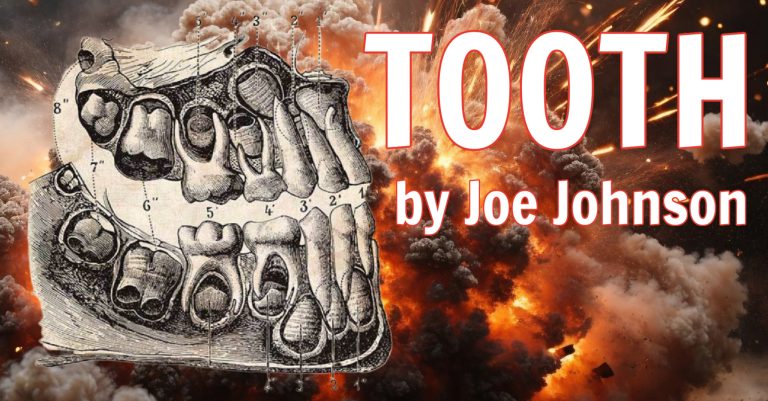
Fiction
TOOTH by Joe Johnson
The itch begins in the jawbone under the gums. I can’t get to it with a finger or tongue or backscratcher. Have to let it itch, like watching a fly you can’t swat tickle your forearm. It’s happened before. Happens more these days. Nothing shows up on x-rays, and now dental insurance is all used up.The tooth itches as the boss talks. He’s wearing a suit on casual Friday. It’s gray and fits him in the shoulders but not the belly, so he leaves it unbuttoned. The blue striped tie hangs over his belt. It’s like he’s guest-hosting a nineties talk show. The boss scans the room as he talks, and it’s like he’s looking right at you. He makes that passing sort of eye contact of CEOs and preachers. The way experts do during their TedTalk on the secret history of statistics. You know the talk: This message will change your life.The office is desks and phones, like in old movies. Phones on every desk, desks in every cubicle. Phones now ring in the background because the boss has gathered us to stand by a long table—a hundred of us, the whole floor, in a semi-circle. The table is in front of the west windows overlooking the city. On the table sits a vase. In the vase, an orchid. By the orchid is a box. The boss is in front of the table. He raises his arms in symmetry. He learned this somewhere, probably the same boss school that taught ambiguous eye contact and said to give bad news on Friday afternoon. The boss, we all know, is about to lay half of us off. Year-end is the time of “tough” choices. Boss school must have taught him, Make sure to look like this hurts you too; you did everything you could.Right then, the itch itches, just at the bottom of the molar. Those roots go down into the bone. The boss is saying something about Hannibal crossing the Himalayas on elephants. He’s going to quote the Dali Lama. Put money on it.Speaking of the Dali Lama, four summers ago, on my two-week vacation, I was in India on overcrowded sidewalks. A bike courier blazed by in his cotton shorts and glasses and no-helmet, just pumping. He turned past a truck, then around a car, then hopped onto the sidewalk. But a pigeon, swear to God—didn’t even know India had pigeons—plopped down in front of him. Pigeon, gray and blue and clueless, stalled right in the path between the bicyclist, a bus in the road, and a fire hydrant.Instincts took over: Bicyclist turned, missed the bus but rammed into the hydrant. The bicyclist was going as fast as the cars were supposed to be going, so when he fell off the bike, his body flew car-speed. The pigeon didn’t flinch. Just waddled along while the bike bounced into the road and went under the bus tires, as the bicyclist soared overhead, like, yes, a bird, but landed like an egg. Rammed his unhelmeted head into a bench. The crowd swarmed the bicyclist. He was laid flat out, maybe breathing. All I remember is a tooth on the sidewalk. A whole tooth, the big molar. It’s like a wicked iceberg—the top half is rounded and blunt, but beneath that flat top a root system runs sharp and long, like those Italian horn pendants disco dancers used to wear. The bicyclist’s molar was speared with two points. Those points, when not being knocked out, stick in the bone beneath the gums.That’s where the itch is: in the bone, at the tips of those points at the end of the molar. Not a strong itch, just an unreachable one. But it goes on long enough—boss talks about how proud he is of what we’ve all accomplished “together” (arms raised like an Olympian)—and the idea of finding pliers and pulling the thing out seems reasonable.“…over the Himalayas,” says the boss. Himalayas? Hannibal crossed the Alps.While the boss is riding mastodons up Everest, here in the room, across the circle of employees gathered near the west windows overlooking the city, standing beside the boss, one of the secretaries, Shannon or Shelly-something, sneezes. And that slows the boss. The boss says “Bless you” like a priest. The sneeze, though, sparks an idea: Fake a cough. In the cough, maybe with my mouth covered, I could stick my thumb inside and wiggle the tooth. A wiggle usually makes the itch stop. Except the boss is the center, like the sun, of a half circle, and we’re in orbit around him, but also directly across from our current (and future-former) coworkers. So maybe a push against the cheek. The right hand comes up slowly. Don’t draw attention. Move like the room has motion detectors. Then a test—just a quick scratch of the neck, like maybe the heater kicked on and the breeze set off the small hairs. Nothing to notice. Take your time. The boss isn’t going to stop until he’s scaled Mount Kanchenjunga.No one turns. They’re all still focused on the boss. No one watches the fingernails scratch the side of my throat—up, down, small circle. The scratch takes focus off the tooth, but not all. Like a mosquito has somehow gotten inside. That moment when the mosquito is in the vein, before it pulls out and the brain says, “Kill it.” But by the time you notice a mosquito, it’s already got your blood, and left its spit.Boss pauses. This is the emotional climax. He says something about Nepal, and you know that he practiced this in front of a mirror. He’s got a ring on his finger. He practiced this for his wife. I assume he’s straight. It’s something about the suit, the off-the-shelf that doesn’t fit. He said to his wife, “How does this sound?” and he raised his arms and rehearsed, “The real test of character comes not in victory but in loss.” She said, “It’s great.” She asked if they had anything going on Sunday because an old college friend was in town and wanted to go for lunch. The boss said, “Sounds fine.”Then my knuckle pushes against the cheek, and it does nothing. The cheek is condoms. There’s no way to get to the itch without going in. But the sneezing secretary is looking across now. She knows who the boss means when he says, “and even in hardship.” For the boss she typed up all the emails and attachments waiting in our inboxes, ran the names by HR. She’s probably screwing Boss. His “Bless you” was too concerned. Boss probably tested his speech on both wife and mistress. He’s that kind, like Hannibal: too much man for one woman. Leaves his seed in every town he conquers. Or maybe I’m thinking of Genghis Khan.So, the thing to do is bring the other arm across the chest, to support the arm raised to the cheek, to tilt the head in the look of serious concentration: the dreamy co-ed in that Indiana Jones movie. The secretary is scanning the circle now. She looks past me. Doesn’t make eye contact. Maybe that means I’m not getting laid off. Or that I am. Once the secretary’s gaze returns to the boss, I push in again. Hard. And the push helps. It’s a dull pain. Cheek smushed into all the teeth. And the pain feels good. Push harder. The itch is still there, but the cheek, the inside mashed against the jaw, helps. The cheek warms like a fever.The boss pauses. He drops his arms. Puts them into his pockets and billows the edges of his suit jacket up and out. He stares at the ground. This is the point when all of us, fired and unfired, are supposed to feel for him. His Sophie’s Choice. This is when he talks about the American spirit after 9/11.It’s a stupid job anyway. Lay me off. Let me go. Terrible dental.The boss has his hands in his pockets, like a sign to do the same—lower my arms. Uncross. Unclench. And as soon as the cheek pain settles away, the itch comes back stronger. The tingle, like centipede feet. Inside the jaw, at the pointy tips of the molars in the bone. You would kill to fly unhelmeted and head-first into a bus bench. You would kill for pliers.And you can’t believe it, but that’s what the boss has. He pulls them from his pants pocket. One of those Swiss Army knives. No, a Leatherman. They don’t let you take those things on planes anymore. Someone would hijack a Delta with a Leatherman: “Take me to Cuba. I have a bottle opener.” With his Leatherman in hand, the boss reaches back toward a box on the table by the orchid in a vase. The box is sealed, so the boss needs the Leatherman to clip the straps on the box. Everyone is looking at the box. They all want to know what’s in the box. But I’m following the Leatherman with the knife out, with the pliers tucked inside.The boss sets the Leatherman on the table. The secretary watches the boss lovingly, excited about the box.The boss smiles. From the box, straps clipped, he pulls out a trophy. A real trophy, like they used to give in bowling leagues in those days when men wore Italian horn pendants and took knives on planes. He’s talking about the trophy, about Bill in Engineering, and forty years of service.Bill walks through the middle of the half-circle to the boss. The boss is all smiles. Couldn’t be prouder if Bill were his own father. Forty years of devotion. And there’s no way to replace that much knowledge and skill. No way to replace Bill. The company won’t be the same without him. But the boss and his secretary will make do. They’ll probably both get bonuses for replacing Bill with two part-timers in India.So then I step behind the circle and walk the perimeter because everyone is watching Bill get his trophy, even the secretary. Secretary most of all. The secretary seems really glad Bill is leaving. She says, “What are you going to do with your free time?” Bill grips the trophy and shrugs. And I’m closer now, side-step by side-step.The Leatherman waits on the table by the vase. Almost there. Jenny in accounting turns back, but not before I’m past her. Eyes forward, Jenny.Bill says he’s looking forward to time with the grandkids. What else is he going to say? That he’s planning to leave his wife. That he has a one-way ticket to Las Vegas. Gonna blow twenty-grand on legal prostitutes who smile when he asks for a birthday special.Now I’m at the table, behind the secretary, and the secretary has a good rear for someone who sits as much as secretaries sit. It’s just an observation. I don’t mean anything by it, but it is a surprise. How she lives at a desk, but she’s tight as a gymnast. It’s impressive. Just that kind of discipline.The tooth pulses now. Dull throbs, like a strobe light. And maybe it’s the movement, shuffling my way behind the half-circle, the blood pulsing. It’s pushing now. The boss says, “Let’s give Bill a hand.” The applause is my shot. So I press past, behind the secretary’s behind, reach across the table. My forearm grazes the orchid vase. It wobbles. I pluck the Leatherman. Pull it back smooth and quick as the boss says, “Bill, we’re going to miss you.” Orchid vase teeters. Vase does a spin like a coin settling—heads, tails. Vase stops.Bill takes his final walk back across the circle. Don’t worry, Bill. You aren’t the only one going home today. At least you get a trophy.And I’m back out, careful to slide the tool into my pocket, holding it with my left hand so it doesn’t slip and cut through the fabric. Moving step by step around the outside, past Jenny in accounting. Jenny’s not looking, but she steps back and closes the gap between me and the wall, and it’s her or the wall, and I plow into Jenny. Watch where you’re going, Jenny.Jenny teeters. She stumbles into the accountants, but I press on—didn’t even nick my thigh with the knife. The boss says, “On a serious note.” He’s at the end, and I’m back where I started. The boss pauses because the accountants are mumbling, and Jenny is straightening her shirt. The boss backs it up and tries again. “On a serious note,” he says. He says he’s done everything he can. He says, “But it’s like the Dalia Lama said, ‘If a problem cannot be solved there is no use worrying about it.’”He has a point there. When the pink slip comes my way, I can’t control that. The secretary waves her arms to get our attention. Good arms. Secretary is thirty-five, maybe forty, and goes sleeveless. She invites everyone to join in the break room. There’s cake for Bill. Cake for the lot of us who have emails waiting in our inboxes: instructions for What’s Next on our own journeys across our personal Himalayas.Then the circle collapses, splits into a hundred points all shuffling back to cubicles or to the break room, some patting Bill on his shoulders, Bill with his trophy on his way to claim his cake. The itch might go away with cake, the chewing. At least then, if I stick a fork in my mouth, no one cares. And I could cut the cake with the Leatherman, with the knife edge pressed against my thigh. But the cubicle first. The email, the merciful email.Back at the desk, the itch slows. I’m in my own cubicle, surrounded by a portrait of the 2001 Seattle Mariners, Taylor Swift bobblehead from a niece. I set the Leatherman on the desk. Close the blade. It’s the pliers I want.The computer screen wakes. It knows I’m back and has messages for me. The computer talks with other computers and already knows what the other computers know. Computers are gossips. From the other cubicles come the first sighs and oh-shits and thank-gods. The murmur like a hive. No one uses the office phones on their desks. They pull out their personal cells to call home. “Honey, I got bad news.” Some whimpers. Some sniffles. And I don’t know if the cries come from the people laid off or those left behind.My computer is slow. I’ve been asking for a new one since Halloween. The inbox is buried under windows. And by the time I get to it, there’s nothing. During that whole boss-talk, I missed six emails about invoices, but nothing like “it saddens me” or “we thank you for your service.” And the tooth pulses again. The Leatherman goes back in my pocket, and I head to the breakroom because at least there’s cake and maybe that will help. Maybe there’s ice cream with the cake and that can numb everything. Sometimes when this happens, I get a glass of crushed ice from the breakroom fridge dispenser and pinch the ice between cheek and gum like chew. The dentist says that’s no good. He says, “Have you tried B-complex vitamins?” Yes, and peppermint tea bags and hydrogen peroxide and Anbesol.Bill is by the microwave and flanked by other engineers. Bill’s happy, which is odd because no one’s ever happy. Yes, sometimes people are pleasant or amused, but never happy. And how the hell did Bill make it forty years—and is that the secret: that if you can give the company four decades, you get to be happy. In thirty-four years, I’ll grin like a piñata.No ice cream. And the cake doesn’t help. It’s white and over-sugared with supermarket raspberry jam for filling. The chocolate frosting is dry as plaster, but the breakroom fills with chatter about how good the cake is. Jenny in accounting says, “The cake is great.” You know nothing about cake, Jenny.I’m standing by the cake and Bill comes over for a second slice. He doesn’t want a whole piece. “Just a sliver,” he says, and I’m standing at the table by the cake, and Bill’s looking for a knife.“I have a knife,” I say, and pull from my pocket. “Great Leatherman,” says Bill. But he doesn’t take it.So I ask him, “What’s the secret?” Bill grins but won’t tell. Then the itch comes back like an allergy. And I know how rude this looks, but, on Monday, Bill will be in Vegas pouring massage oil on hookers, so I just do it. I set the Leatherman down by the cake and reach my hand inside and wiggle the tooth. My hand comes out pulling a string of spit—like I’m a basset hound.“Itch?” says Bill. He smiles like one of those wise Cherokee in every western movie. “Yes,” he says, “there’s a secret.” Bill sets down his plate. He moves his hands to his mouth. He flinches, pinches around, and draws from between his lips. Out, in his glistening hand, comes his top dentures. Bill smiles like a railroad tramp, all gums. And his face falls saggy. But happy saggy. Then tilts his head, puts the plate back in, bites down, and restores his face.He says, “Pliers don’t work. I know a guy who can get you forceps. And lidocaine.” Then Bill says he’s changed his mind and takes the full slice. He grabs a piece with his hand and sets it on his plate, then licks the raspberry jam from his fingers. “Here,” I say, and lift the Leatherman to Bill once more. “Congratulations,” I say. But Bill says he already has all the Leathermans he needs and walks back to the guys from Engineering with his full slice of cake.The Leatherman is perfectly designed. A knife and a saw and pliers all in one working unit. The knife for cutting cake. The pliers for pulling teeth. And maybe Bill is wrong about pliers. Only one way to find out. And maybe the company that makes the Leatherman is hiring, needs a good accounts guy. Probably that company has amazing dental. I could leave, at least after the Christmas bonus—no sense going before then. And the tooth isn’t itching now. And if the itch comes back, I know how to handle it. If it gets too bad, I have the pliers to rip that thing out or can get lidocaine from Bill’s dealer. I’ll take action. It’s like the Dalai Lama says, “Happiness comes from your own actions.” Or maybe it was Hannibal or Genghis Kahn. Either way, isn’t being happy what it’s all about.
April 30, 2025
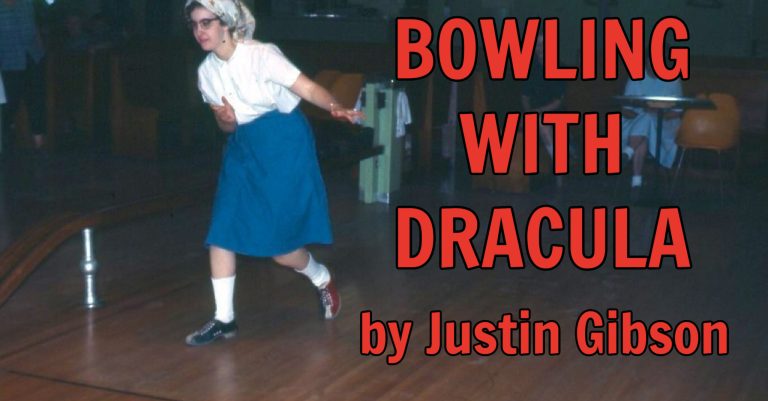
Fiction
BOWLING WITH DRACULA by Justin Gibson
The first thing we discovered was that vampires loved contracts. Well, no, sorry, I guess the first thing we discovered was the vampires themselves — that they’re real. We figured it out pretty quick, as pets went missing; as we started to get the heebie-jeebies when twilight flooded our backyards a cool blue; as pale strangers stood outside our windows in the middle of the night and asked if we’d let them in, voices like warm caramel. Very strange stuff for these parts, but very obvious: That’s vampires. But we figured out vampires loved contracts almost right after that. Erik Donahue down the street had the bright idea to finally say “let’s make a deal” to the ghastly specter of death hanging around his porch, pleading to be let inside. The specter of death very quickly produced parchment and pen from under its flowing black cloak, and said in a heavy European accent, “I am ready to record the terms of our agreement.” That first agreement was basically, “if I let you in, you can’t eat me and you have to shut up so I can get some sleep.” It ended with a house cat being eaten, and the cheeky devil gleefully pointing out that no terms had been broken. Still, it gave us two huge insights. Vampires like contracts. Vampires didn’t break contracts.It was only a day or two after that we had a mandatory HOA meeting to discuss our next steps. We couldn’t fight vampires outright: They were ancient beings of unspeakable evil and hunger, and we were a collection of working professionals and stay-at-home parents, barely equipped for a holy war beyond the odd hand gun. Calling the police or the military was also out of the question — we had property values to consider.I’ll be the first to tell you that the meeting almost wasn’t productive. The scars of past grievances and petty squabbles were just too fresh. Mr. Morton’s azaleas trashed by some kids’ hide-and-seek contest that spilled over into his territory. Debra Vorhees canceling book club at the last minute three times when it was her turn to host. Little Jimmy Merkins and his motley gang of ding-dong ditchers. Too many people seemed keen to enact some sort of lottery system; where the shortest straw or the lowest number or the painted pebble was simply sacrificed to the vampires every week/other week/month. Where every rules violation — be it a garbage can left on the street after pick-up, a hedge that wasn’t trimmed, a due that wasn’t paid, or a lawn that hadn’t been adequately cut and weeded — was simply punishable by death by vampire. Where we’d all just collectively feed a neighbor to these gaunt bloodthirsty shadows and make a big show of brushing sweat off our brow and going “phew!” like some sort of cartoon, because it hadn’t been us. Because we had been lucky.The sentiment that ultimately won out was: This is America, dammit. The land of freedom and bootstraps, elbow grease and jackpots. We all deserved to have a fighting chance, not just a random chance. If these monsters were going to be in our neighborhood, insisting they ate us, we deserved some sort of trial by figurative combat. To die with our boots on, standing up. The question then became: What should the combat be? What was a thing we all had a shot at?It was ultimately me that pointed out that we all bowl, but someone else was bound to get there eventually. Thanks to the neighborhood bowling league, our whole little subdivision did bowl — just about every Friday night. It was probably the one thing we had in common besides proximity and gossip and floor plans. Fostering and running this league had been my way of contributing to the community since I had moved in. The fact that I am the proprietor of Bowl-O-Rama is frankly just coincidence. I’ve always loved bowling; I’d organize a league even if I didn’t own a bowling alley. We had Jerry Vorhees, an attorney who lived two streets over, draw up a contract. We all signed, and that evening Jerry handed it off (through his living room window) to a vampire to have all them review it and sign if they approved. They returned it that same evening, no amendments or changes. Cocky bastards.That first Friday after was the inaugural bowling competition. Mrs. O’Hara, a grandmother at the end of the cul-de-sac, had hand-painted “Bowling with Dracula” on a cloth banner and hung it over Bowl-O-Rama’s entrance. The vampires grumbled at this; I guess Dracula was a sore spot for them. It was for that reason I’ve made sure to hang it every single week since. Despite that first time being almost business as usual for our group, there was a nervous undercurrent in the air. Like there was one sentence on everyone’s tongues that wasn’t being said. It was being spelled out, morse-code style, in the flitting glances we all traded each other. People shifted on their feet, weighing how heavy the air was — and if it might slow them down if they had to make a break for it. It was pretty easy to edit the existing bracket to now include the vampires. Now, instead of advancing further in a tournament, we were just all paired off with a bloodsucker. Everyone had one match to come out on top. Winners won the right to live another week, unbothered by the vampire’s nighttime solicitations. Losers were be drained outside in the back alley by the dumpsters, to avoid making a mess. The third thing we discovered was vampires are absolute dogshit at bowling. Maybe it was their wraith-like fingers that made it impossible to properly grip the bowling ball. Maybe it was their night vision that made it tough for them to see the oil patterns on the smooth wood. Maybe it was their flowing capes and cloaks that would set off the sensor at the front of the lane. Really though, I think it just came down to them being totally green behind the ears. Zero concept of what bowling was about. You’d think for being immortal beings, they would’ve lived a little. Branched out beyond stalking prey and writing contracts at some point. No joke, they were only getting one to four pins a game. Everything else was a gutter ball. Frankly, it was impossible for us to not trash talk this performance. “Ay, Count Sucks-Ass-ula, try hitting the pins next time.” “Have you guys always lived in gutters like this? I guess it must be cozier than a big castle.” “No sorry, bumpers are only for those under 300 years old. You’re a big boy, go ahead and throw it.” “If it helps, we’ll all pray for you to get a pin this time? Oh! Right, sorry, damnation. Forgot.”“I heard werewolves were great at bowling. Really makes you think, huh?”It got to the point that the cheers and whoops and jeers that would erupt at their garbage scores would shake the walls; we started toning it down only when someone worried that we might knock more of their pins down with our noise. The vampires left the Bowl-O-Rama defeated, dejected, and, we assume, on the hunt for some rats or squirrels to suck down since our pets were also now covered by the contract.That’s been life here ever since: Every Friday, we all get together and beat the bejesus out of a bunch of pasty Nosferatu dweebs to win another week of living. Bowling is typically a pretty social game, but besides the occasional trash talk, we hardly acknowledge them. I couldn’t tell you what any of their names were, or where their homelands were, or what it’s like being undead. Just knowing that they want to drain me is all I need to know. The most talking they might do on their end is a grumble that they’d like to revisit the terms of the contract. At this, we’d give them the bird and tell them to go suck a rat. I want to take a second to say — we’re just regular people, not dumb. We recognize these are immortal beings of endless appetite. Unholy things shaped and forged to utmost evil over the course of centuries. They’ve seen empires come and go. We can see that their scores continue to improve by a pin or two every couple of months. We know time is on their side; they will eventually, with enough practice, figure this out. That unspoken sentence is still at the tip of all our tongues. Someday, one of us will probably, finally, say it out loud. But that is a problem for future us, perhaps maybe even our children, or their children. For now, we’re together and we’re alive. Every Friday night at the Bowl-O-Rama, the beer is cold, the chicken wings are saucy and you simply cannot not bob your head and tap your foot to the music coming from the jukebox. Every strike we throw sounds like a thunderstorm, or a car crash, or the hands of God applauding us for how we’ve gotten on so far. Tonight, as it has been every night, life is good, even with all things considered and present company accounted for.
April 28, 2025
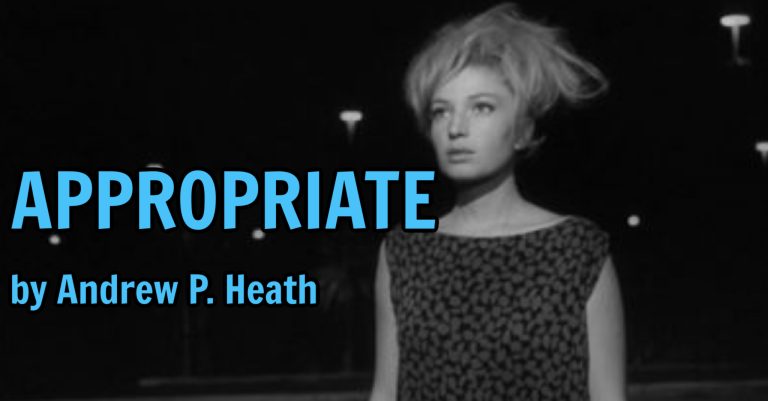
Fiction
APPROPRIATE by Andrew P. Heath
She said something vague to me. I said something appropriate. She said, What? I said something appropriate. Looking at her. Her collarbone. She said something sarcastic. I said something appropriate. I looked at her collarbone, then slowly looked up at her face. She looked like a cocker spaniel (I did not say that). I had once been very attracted to her. When she would take a shower, I could hear the water running, and I imagined her in there, elegant, graceful, small, her long black hair slicked across her white body. The image was potent and intoxicating, I was drunk in my bed. When she left the bathroom, I would go in and there would be steam and a musky herbal scent. She was speaking, nervously, it seemed. When I don’t say anything, she tends to go on, I thought. I said something appropriate. Our eyes met for exactly one second. She was once very attractive, but now she looked like a cocker spaniel. She has not changed, I thought, I have changed, our relationship has changed. I have not changed. Have I not changed? I became aware that the conversation was strained, uncomfortable. I smiled. I nodded. I said something appropriate. Once, in the middle of the night I poured myself a glass of water and she appeared behind me in ball gown. She said something to me, then. I don’t remember if I said anything back, but if I did, I’m certain it was appropriate. She said, well, goodnight, and left the apartment. On a different night she was in the bathroom. The door was ajar. I could see through the crack of the door the shower rod was pulled down into the tub. I tapped on the door three times with the fingernail of my right index finger. She said, I’m sorry. I didn’t say anything. I went back to bed. I pissed out of my window.
April 25, 2025

by Mike Topp
$25 | Perfect bound | 72 pages
Paperback | Die-cut matte cover | 7×7″
Mike Topp’s poems defy categorization. That’s why they are beloved by seamstresses, pathologists, blackmailers and art collectors.
–Sparrow

